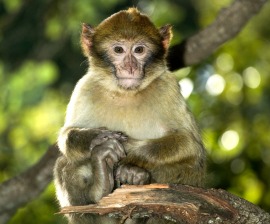-

Not a good pet. Martin Harvey/Alamy
Several thousand monkeys and other non-human primates are believed to be in private ownership in the UK.
The most commonly kept species, which include marmosets, tamarins and squirrel monkeys, don’t even need to be registered with the authorities.
The keeping of these primates as pets, along with the associated trade to supply the demand for them, raises serious concerns:
- Unlike “traditional” companion animals such as dogs and cats, they have not undergone thousands of generations of domestication.
- The complex needs of these highly intelligent animals cannot be met in a home environment. Primates who are rescued from private ownership—where they are often kept alone, in spite of the highly social nature of most species—invariably show serious problems such as stereotypical behaviours, self-harming, and nutritional disorders.
- Strong and unpredictable, they can pose a significant risk to public safety. In the U.S., more than 260 people have been injured by pet primates since 1990.
- All non-human primates have the potential to carry a range of infectious diseases that can affect people (zoonoses), including Cercopithecine herpesvirus 1, hepatitis, tuberculosis, intestinal pathogens, and a variety of parasites.
- The collection of some species of primates for the pet trade may also present a threat to their conservation status.
Send a message to the UK government: End the keeping of primates as pets.
Support for a ban
A number of countries have already banned, restricted or regulated the private keeping of non-human primates, including Denmark, Bulgaria, Sweden, Belgium, the Netherlands, Switzerland, Canada, 24 US states, Australia, Israel, Mexico and Honduras.
Many organisations and experts support calls for a ban, including the four Primate Advisory Groups of the Association of Zoos and Aquariums in the United States, The Jane Goodall Institute, the American Veterinary Medical Association, the American Society of Primatologists, the National Association of State Public Health Veterinarians, the Federation of Veterinarians of Europe and the British Veterinary Association.
“Primates are long-lived, intelligent, socially-complex animals and we can think of no circumstances where they would benefit from being kept as a pet.” British Veterinary Association President, Robin Hargreaves.
“Strong evidence supports the argument that primates are not suitable pets; it is unlikely that the welfare of pet primates can be adequately addressed in normal households” … “[This report] identifies a wide range of concerns about keeping pet primates and concludes that this practice should end.” Soulsbury et al. 2009. The Welfare and Suitability of Primates Kept as Pets. Journal of Applied Animal Welfare Science 12
Current UK legislation
Owners of pet primates are required to provide for the health and welfare of their animals under the Animal Welfare Act 2006. However, the Animal Welfare Act does not provide for any form of registration or inspection of pet primates.
The only licensing and inspection requirement that applies to some privately owned non-human primates comes under the Dangerous Wild Animals Act of 1976, but the most commonly kept species in the UK are not covered by it. Non-compliance by owners and a lack of enforcement are also problematic.
A voluntary Code of Practice for the Welfare of Privately Kept Non-Human Primates introduced in 2010 is too generic, and not legally binding.
Opportunity for change
The Environment, Food and Rural Affairs Committee is considering whether to recommend a ban on the private keeping of non-human primates. In our submission to the EFRA Committee, HSI/UK called for a ban on the private keeping and the associated trade in these animals.
Public opinion and significant expert and scientific opinion support a ban. A 2013 poll carried out by ICM Research, revealed that 65 percent of British people thought that the keeping of primates as pets in the UK should be illegal, with just 11 percent believing it should remain legal.
HSI/UK is campaigning to protect primates. They belong in the wild, not in our homes. Take action to help.
